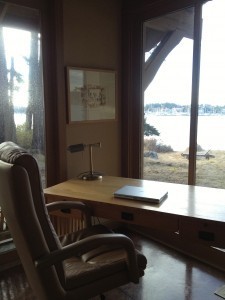I have always had a lot of trouble keeping projects moving steadily ahead — it’s not that I don’t ever finish anything but that it all happens in such fits and starts that it can be psychologically distressing. I never quite enjoy the feeling of making forward progress, even when I am, because so often I write in snatches of time rather than nice, leisurely hours or weeks or months of time.
This is one of the reasons I wrote Everyday Writing — to find ways to keep my projects moving along even when I don’t have time to write. And I love all the little ways I’ve found to do that. But, having recently returned from a residency at the amazing Helen Riaboff Whiteley Center in Friday Harbor, I’ve also realized how important it is to balance my everyday writing with the serious, get-down-to-business writing that we all need in order to see a project through to completion.
I achieved more in one week at Whiteley than I had in months of my regularly scheduled life. This is exactly what a retreat is supposed to do, and why we need to make time for them. And being there was not only great for that reason; I also came home determined to keep up a better pace on a daily basis. I knew, of course, that the real world wouldn’t allow for quite the same level of productivity … but I did learn a few things that have made my post-Whiteley writing life so much better.
Below are a few tips related to the things I’ve discovered …
Know yourself. Be honest with yourself. And create a schedule that truly works. Before Whiteley, I’d been getting up at 6 a.m. (or earlier, depending on how hungry the cat was and how obnoxious he was about it) and doing my writing then. I figured I needed to get it done first thing, or the whole day might go by with no writing happening. While this was all too true, another thing I’ve realized is all too true is that I’m not a morning person. And yet another thing that is true is that I am a bit of anxious person, and knowing I had emails piling up in my in-box made it hard to focus. In other words, I realized I needed to carve out a better time to write.
At Whiteley, I was there to write and only to write: I had committed to leaving the day job behind. Yet being self-employed and running a small press, I couldn’t leave everything completely behind — while I’d cleared the week ahead of time, I did have to check in just in case something came up that needed immediate attention, and sure enough a few things did. But I’d made rules for myself, and I stuck with them: I got online first thing in the morning and once more in the evening — and no more. And not only was I able to stay on top of things in only a small amount of time, but I realized how well this worked for my writing — by taking care of business before getting to my writing, I could clear my mind of nagging worries, deadlines, and other issues and free my brain for creative work. And by checking in once more after dinner, I could be certain all was well and keep the creativity flowing.
So now that I’m home, instead of getting up early to write, I get up early to get to work. And, nearly every day since I’ve been back from Whiteley, I’ve been taking an hour or two in the afternoon to go to the university library to write. These hours are always far more productive than my early morning hours ever were — because I’ve taken care of business, and because I’m far more awake and ready to write by then.
Find a dedicated writing space — or create one. For me, a huge challenge is writing at the same place I do everything else. So I fired up my ancient, clunky laptop, and I’m portable. I lug it out of my office for my writing time, and it doesn’t matter where … whether it’s the dining room table or the library or a cafe, I’m away from the Regular Work. I disable the wi-fi so I can’t check email or Facebook; I can’t do anything, really, but write. Below is the idyllic writing space I had at Whiteley — and while I haven’t quite been able to replicate that, I make sure I don’t have distractions, and this is the next best thing.

Take breaks. As many as you need. The other thing I did often at Whiteley was take breaks. It’s necessary when all you do for sixteen hours a day is write. So I learned to break up my writing sessions: with meals, with hikes, with a change in setting. Sometimes it was a quick break to make tea; other times I would head to American Camp to look for the sweet red foxes who live there.

And even if you’re only writing for two hours a day, you need breaks. It may seem like cheating to step away from the computer during your writing time, but in fact it is necessary and often even helpful — most of my writing epiphanies have come when I’m anywhere but sitting at my desk. So as soon as I get restless, I’ll go for a hike or a walk, or even run an errand if it gets me out in the fresh air. Being in nature is always the best and most soothing first option, but just getting away from the page can be a big help in terms of solving problems in the work at hand. Be sure to observe the world around you, whether it’s a forest or a city park — and if you’re stuck on a specific scene, for example, view everything you see through the eyes of one of your characters, and see how that goes.
These tips are not new; in fact, they’re pretty obvious. I’ve both heard them and repeated them a thousand times — yet here I am, discovering them all over again. It’s amazing how often we hear good advice and how seldom we follow it.
So, your assignment for today: Do at least one, if not all, of these things during your next writing session: change your writing schedule/routine and see how it works; find a new writing space and see how you like it; and schedule a break one hour into your writing time, and take it. Shake things up, even if you think you don’t have to. Change is good.

 newest »
newest »
 newest »
newest »
 Good tips Midge. Thank you! Allie
Good tips Midge. Thank you! Allie







